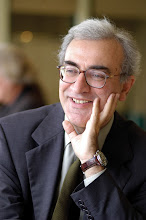.
Michael Roth assina hoje no New York Times um excelente artigo de que extraí este pedaço:
Michael Roth assina hoje no New York Times um excelente artigo de que extraí este pedaço:
To be sure, Dewey recognized the necessity of gainful employment. “The world in which most of us live is a world in which everyone has a calling and occupation, something to do,” he wrote. “Some are managers and others are subordinates. But the great thing for one as for the other is that each shall have had the education which enables him to see within his daily work all there is in it of large and human significance.”Education should aim to enhance our capacities, Dewey argued, so that we are not reduced to mere tools. “The kind of vocational education in which I am interested is not one which will ‘adapt’ workers to the existing industrial regime; I am not sufficiently in love with the regime for that.” Are we?Who wants to attend school to learn to be “human capital”? Who aspires for their children to become economic or military resources? Dewey had a different vision. Given the pace of change, it is impossible (he noted in 1897) to know what the world will be like in a couple of decades, so schools first and foremost should teach us habits of learning.For Dewey, these habits included awareness of our interdependence; nobody is an expert on everything. He emphasized “plasticity,” an openness to being shaped by experience: “The inclination to learn from life itself and to make the conditions of life such that all will learn in the process of living is the finest product of schooling.”The inclination to learn from life can be taught in a liberal arts curriculum, but also in schools that focus on real-world skills, from engineering to nursing. The key is to develop habits of mind that allow students to keep learning, even as they acquire skills to get things done. This combination will serve students as individuals, family members and citizens — not just as employees and managers.(...)In a nation that aspires to democracy, that’s what education is primarily for: the cultivation of freedom within society. We should not think of schools as garrisons protecting us from enemies, nor as industries generating human capital. Rather, higher education’s highest purpose is to give all citizens the opportunity to find “large and human significance” in their lives and work.
.




Sem comentários:
Enviar um comentário